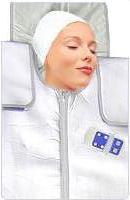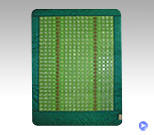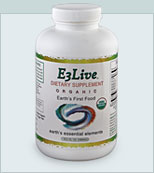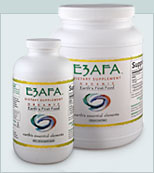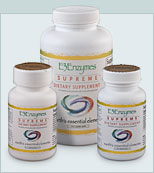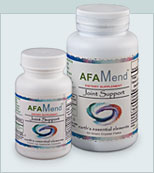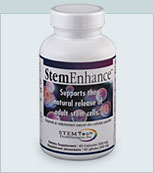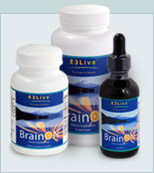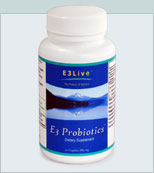. Home|View Shopping Cart|Privacy Policy|Contact Us
AlkalizingNutrition.com
The
Fundamentals of Vibrant Health
SAM-e Depression Research Studies
Psychiatry Res 1995 Apr 28;56(3):295-7
Rapidity of onset of the antidepressant effect of parenteral S-adenosyl-L-methionine.
Fava M, Giannelli A, Rapisarda V, Patralia A, Guaraldi GP
Depression Research Program, Massachusetts General Hospital, Boston 02114, USA.
A possible method of reducing the delay in antidepressant response is to use S-adenosyl-L-methionine (SAM-e), a naturally occurring compound that appears to have a rapid onset of effect in the treatment of depression. In this open, multicenter study, 195 patients were given 400 mg of SAM-e, administered parenterally, for 15 days. Depressive symptoms remitted after both 7 and 15 days of treatment with SAM-e, and no serious adverse events were reported. Further studies with a double-blind design are needed to confirm this preliminary indication that SAM-e is a relatively safe and fast-acting antidepressant.Acta Neurol Scand Supply 1994;154:7-14
S-adenosyl-L-methionine (SAM-e) as antidepressant: meta-analysis of clinical studies.
Bressa GM
Department of Psychiatry, University Cattolica Sacro Cuore School of Medicine, Rome, Italy.
INTRODUCTION - S-adenosyl-L-methionine (SAM-e) is a naturally-occurring substance which is a major source of methyl groups in the brain.
MATERIAL AND METHODS - We conducted a meta-analysis of the studies on SAM-e to assess the efficacy of this compound in the treatment of depression compared with placebo and standard tricyclic antidepressants.
RESULTS - Our meta-analysis showed a greater response rate with SAM-e when compared with placebo, with a global effect size ranging from 17% to 38% depending on the definition of response, and an antidepressant effect comparable with that of standard tricyclic antidepressants.
CONCLUSION - The efficacy of SAM-e in treating depressive syndromes and disorders is superior with that of placebo and comparable to that of standard tricyclic antidepressants. Since SAM-e is a naturally occurring compound with relatively few side-effects, it is a potentially important treatment for depression.Drugs 1994 Aug;48(2):137-52
The clinical potential of ademetionine (S-Adenosyl-Methionine) in neurological disorders.
Bottiglieri T, Hyland K, Reynolds EH
Metabolic Disease Center, Baylor Research Institute, Dallas, Texas.
This review focuses on the biochemical and clinical aspects of methylation in neuropsychiatric disorders and the clinical potential of their treatment with ademetionine (S-Adenosyl-Methionine; SAM-e). SAM-e is required in numerous transmethylation reactions involving nucleic acids, proteins, phospholipids, amines and other neurotransmitters. The synthesis of SAM-e is intimately linked with folate and vitamin B12 (cyanocobalamin) metabolism, and deficiencies of both these vitamins have been found to reduce CNS SAM-e concentrations. Both folate and vitamin B12 deficiency may cause similar neurological and psychiatric disturbances including depression, dementia, myelopathy and peripheral neuropathy. SAM-e has a variety of pharmacological effects in the CNS, especially on monoamine neurotransmitter metabolism and receptor systems. SAM-e has antidepressant properties, and preliminary studies indicate that it may improve cognitive function in patients with dementia. Treatment with methyl donors (betaine, methionine and SAM-e) is associated with remyelination in patients with inborn errors of folate and C-1 (one-carbon) metabolism. These studies support a current theory that impaired methylation may occur by different mechanisms in several neurological and psychiatric disorders.Acta Neurol Scand Supply 1994;154:15-8
S-Adenosyl-Methionine blood levels in major depression: changes with drug treatment.
Bell KM, Potkin SG, Carreon D, Plon L
University of California, Irvine Medical Center, Orange 92668.
INTRODUCTION - The relationship between plasma levels of S-adenosylmethionine (SAM-e), an endogenous methyl donor, and clinical response were studied in patients with a DSM-III-R diagnosis of major depression.
MATERIAL AND METHODS - A double-blind randomized protocol comparing oral SAM-e with oral desipramine, involving a total of 26 patients, was employed.
RESULTS - At the end of the 4-week trial, 62% of the patients treated with SAM-e and 50% of the patients treated with desipramine had significantly improved. Regardless of the type of treatment, patients with a 50% decrease in their Hamilton Depression Scale (HAM-D) score showed a significant increase in plasma SAM-e concentration.
CONCLUSION - The significant correlation between plasma SAM-e levels and the degree of clinical improvement in depressed patients regardless of the type of treatment suggests that SAM-e may play an important role in regulating mood.Acta Neurol Scand Suppl 1994;154:19-26
S-adenosylmethionine levels in psychiatric and neurological disorders: a review.
Bottiglieri T, Hyland K
Metabolic Disease Center, Baylor Research Institute, Dallas, TX 75226.
INTRODUCTION - S-adenosylmethionine (SAM-e) is an important methyl donor in over 35 methylation reactions involving DNA, proteins, phospholipids and catechol - and indole - amines.
MATERIAL AND METHODS - This article reviews the studies that have examined brain and blood levels of SAM-e in several psychological, neurological and metabolic disorders.
RESULTS - Although studies have found no consistent changes in whole blood SAM-e levels in psychiatric patients, other investigators have found low cerebrospinal fluid (CSF) SAM-e levels in patients with neurological disorders such as Alzheimer's dementia, subacute combined degeneration of the spinal cord (SACD), and HIV-related neuropathies, as well as in patients with metabolic disorders such as 5, 10-CH2-H4 folate reductase deficiency.
CONCLUSION--Intravenous or oral administration of SAM-e thus represents a possible treatment for these neurological and metabolic disorders.J Psychiatry Neurosci 1993 Nov;18(5):235-44
The use of diet and dietary components in the study of factors controlling affect in humans: a review.
Young SN
Department of Psychiatry, McGill University, Montreal, Quebec, Canada.
Although one of the first biological treatments of a major psychiatric disorder was the dietary treatment of pellagra, the use of diet and dietary components in the study of psychopathology has not aroused much interest. This article reviews three areas in which the dietary approach has provided interesting information. The tryptophan depletion strategy uses a mixture of amino acids devoid of tryptophan to lower brain tryptophan in order to study the symptoms that can be elicited. One effect of tryptophan depletion is a lowering of mood, the magnitude of which seems to depend on the baseline state of the subject. Therefore, recovered depressed patients often undergo an acute relapse, while normal subjects show more moderate changes of mood. Totally euthymic subjects show no lowering of mood, but subjects with high normal depression scale scores or subjects with a family history of depression show a moderate lowering of mood. These data indicate that low serotonin levels alone cannot cause depression. However, serotonin does have a direct effect on mood, and low levels of serotonin contribute to the etiology of depression in some depressed patients. Folic acid deficiency causes a lowering of brain serotonin in rats, and of cerebrospinal fluid 5-hydroxyindoleacetic acid in humans. There is a high incidence of folate deficiency in depression, and there are indications in the literature that some depressed patients who are folate deficient respond to folate administration. Folate deficiency is known to lower levels of S-Adenosyl-Methionine, and S-Adenosyl-Methionine is an antidepressant that raises brain serotonin levels. These data suggest that low levels of serotonin in some depressed patients may be a secondary consequence of low levels of S-Adenosyl-Methionine. They also suggest that the dietary intake and psychopharmacological action of methionine, the precursor of S-Adenosyl-Methionine, should be studied in patients with depression. Normal meals have definite effects on mood and performance in humans. The composition of the meal, in terms of protein and carbohydrate content, can influence these behaviors. Because protein and carbohydrate meals can influence brain serotonin in rats, these effects in humans have usually been interpreted in terms of altered serotonin functioning. However, the current balance of evidence is against the involvement of serotonin in the acute effects of protein and carbohydrate meals in humans. The underlying mechanisms involved are unknown, but there are a variety of possibilities.Psychotherapy Psychosom 1993;59(1):34-40
Double-blind, placebo-controlled study of S-adenosyl-L-methionine in depressed postmenopausal women.
Salmaggi P, Bressa GM, Nicchia G, Coniglio M, La Greca P, Le Grazie C
Obstetrics and Gynecology Department, University La Sapienza School of Medicine, Rome, Italy.
S-adenosyl-L-methionine (SAM-e) is a naturally occurring substance which is a major source of methyl groups in the brain and has been found in previous studies to be an effective antidepressant. The aim of this study was to assess the efficacy of oral SAM-e in the treatment of depressed postmenopausal women in a 30-day double-blind placebo-controlled randomized trial. During the course of the study, 80 women, between the ages of 45 and 59, who were diagnosed as having DSM-III-R major depressive disorder or dysthymia between 6 and 36 months following either natural menopause or hysterectomy, underwent 1 week of single-blind placebo washout, followed by 30 days of double-blind treatment with either SAM-e 1,600 mg/day or placebo. There was a significantly greater improvement in depressive symptoms in the group treated with SAM-e compared to the placebo group from day 10 of the study. Side effects were mild and transient.
J Basic Clin Physiology Pharmacology 1992 Jan-Mar;3(1):1-17
Antidepressant activity of S-adenosyl-L-methionine in mice and rats.
Czyrak A, Rogoz Z, Skuza G, Zajaczkowski W, Maj J
Institute of Pharmacology, Polish Academy of Sciences, Krakow.
S-Adenosyl-L-methionine (SAM), main methyl donor, was tested in mice and rats in several models which are predictive of possible antidepressant activity. In the forced swimming test in rats the effect of SAM was compared with that of the tricyclic antidepressant amitriptyline. SAM decreased dose-dependently immobility time in the forced swimming test in mice and rats, these effects being antagonized by haloperidol and prazosin (the latter only in rats). Locomotor or exploratory activity in mice and rats was not increased by SAM. D-Amphetamine-induced locomotor hyper-activity in rats was increased by repeated (14 days, twice daily) treatment with SAM. Behavioral stimulation induced by D-amphetamine or L-dopa (given with benserazide) in mice was not changed by a single dose of SAM. The drug reduced hypothermia induced by apomorphine in mice. Hypothermia induced by reserpine or clonidine in mice was not antagonized. SAM increased the amplitude of the acoustic startle reflex. The above results indicate that the psychopharmacological profile of SAM resembles that of antidepressants in only some tests. The mechanism by which SAM produces its antidepressant effect needs further investigation.Psychiatry Res 1992 Dec;44(3):257-62
Efficacy of S-adenosyl-L-methionine in speeding the onset of action of
imipramine.
Berlanga C, Ortega-Soto HA, Ontiveros M, Senties H
Special Studies Clinic, Mexican Institute of Psychiatry, Tlalpan.
A double-blind clinical trial was carried out to evaluate the efficacy of S-adenosyl-L-methionine (SAM-e) in speeding the onset of action of imipramine (IMI). SAM-e is a naturally occurring substance that has been shown to possess antidepressant activity with a rapid mode of onset and minimal side effects. Sixty-three outpatients with moderate to severe depression were included in the study. After an initial 1-week placebo period, only 40 patients entered the active treatment phase. During the first 2 weeks of the trial, half of these patients received 200 mg/day of SAM-e intramuscularly, while the other half received placebo. Simultaneously, oral IMI was administered to all patients at a fixed dose of 150 mg/day. The onset of clinical response was determined by evaluating patients every second day. By the end of week 2, the parenteral treatment was suppressed and IMI was adjusted according to individual needs. Depressive symptoms decreased earlier in the patients who were receiving the SAM-e-IMI combination than in those who were receiving the placebo-IMI combination.Am J Psychiatry 1990 May;147(5):591-5
Oral S-adenosylmethionine in depression: a randomized, double-blind, placebo-controlled trial.
Kagan BL, Sultzer DL, Rosenlicht N, Gerner RH
Department of Psychiatry, West Los Angeles VA Medical Center, CA.
Methylation has been implicated in the etiology of psychiatric illness. Parenteral S-Adenosyl-Methionine, a methyl group donor, has been shown to be an effective antidepressant. The authors studied the antidepressant effect of oral S-Adenosyl-Methionine in a randomized, double-blind, placebo-controlled trial for 15 inpatients with major depression. The results suggest that oral S-Adenosyl-Methionine is a safe, effective antidepressant with few side effects and a rapid onset of action. S-Adenosyl-Methionine induced mania in a patient with no history of mania. S-Adenosyl-Methionine may be useful for patients who cannot tolerate tricyclic anti-depressants. These findings support a role for methylation in the pathophysiology of depression.Acta Psychiatry Scand 1990 May;81(5):432-6
The antidepressant potential of oral S-adenosyl-l-methionine.
Rosenbaum JF, Fava M, Falk WE, Pollack MH, Cohen LS, Cohen BM, Zubenko GS
Clinical Psychopharmacology Unit, Massachusetts General Hospital, Boston 02114.
S-adenosyl-l-methionine (SAM-e), a naturally occurring brain metabolite, has previously been found to be effective and tolerated well in parenteral form as a treatment of major depression. To explore the antidepressant potential of oral SAM-e, we conducted an open trial in 20 outpatients with major depression, including those with (n = 9) and without (n = 11) prior history of antidepressant nonresponse. The group as a whole significantly improved with oral SAM-e: 7 of 11 non-treatment-resistant and 2 of 9 treatment-resistant patients experienced full antidepressant response. Side effects were mild and transient.J Psychiatry Res 1990;24(2):177-84
Neuroendocrine effects of S-adenosyl-L-methionine, a novel putative antidepressant.
Fava M, Rosenbaum JF, MacLaughlin R, Falk WE, Pollack MH, Cohen LS, Jones L, Pill L
Clinical Psychopharmacology Unit, Massachusetts General Hospital, Harvard Medical School, Boston 02114.
S-adenosyl-L-methionine (SAM-e), a putative antidepressant, is a naturally occurring substance whose mechanism of action is still a matter of speculation. It has been recently postulated that SAM-e may increase the dopaminergic tone in depressed patients. Since dopamine inhibits both thyrotropin (TSH) and prolactin secretion, we investigated the effects of treatment with SAM-e on the TSH and prolactin response to thyrotropin-releasing-hormone (TRH) stimulation in 7 depressed outpatient women (mean age: 46.1 +/- 7.2 years) and 10 depressed outpatient men (mean age: 38.0 +/- 10.0 years) participating in a six-week open study of oral SAM-e in the treatment of major depression. At the end of the study, there was a significant reduction after treatment with SAM-e in the response of both prolactin and TSH to TRH stimulation in the group of depressed men compared to pre-treatment values. On the other hand, in the group of depressed women, the posttreatment prolactin response to TRH did not appear to change when compared to pre-treatment and the TSH response to TRH challenge tended even to augment slightly after treatment with SAM-e. Our results, at least in depressed men, seem to support the hypothesis of a stimulating effect of SAM-e on the dopaminergic system.
Drugs 1989 Sep;38(3):389-416
S-adenosyl-L-methionine. A review of its pharmacological properties and therapeutic potential in liver dysfunction and affective disorders in relation to its physiological role in cell metabolism.
Friedel HA, Goa KL, Benfield P
ADIS Drug Information Services, Auckland, New Zealand.
S-Adenosyl-L-methionine (SAM-e) is a naturally occurring molecule distributed to virtually all body tissues and fluids. It is of fundamental importance in a number of biochemical reactions involving enzymatic transmethylation, contributing to the synthesis, activation and/or metabolism of such compounds as hormones, neurotransmitters, nucleic acids, proteins, phospholipids and certain drugs. The administration of a stable salt of SAM-e, either orally or parenterally, has been shown to restore normal hepatic function in the presence of various chronic liver diseases (including alcoholic and non-alcoholic cirrhosis, estrogen-induced and other forms of cholestasis), to prevent or reverse hepatotoxicity due to several drugs and chemicals such as alcohol, paracetamol (acetaminophen), steroids and lead, and to have antidepressant properties. In all of these studies SAM-e has been very well tolerated, a finding of great potential benefit given the well-known adverse effects of tricyclic antidepressants with which it has been compared in a few trials. Thus, with its novel mechanisms of action and good tolerability, SAM-e is an interesting new therapeutic agent in several diverse disease conditions, but its relative value remains to be determined in appropriate comparisons with other treatment modalities in current use.Encephale 1988 May-Jun;14(3):113-8
[Therapeutic indications of S-adenosyl methionine in neuropsychiatry].
[Article in French]
Tramoni AV, Azorin JM
Clinique de Psychiatrie et de Psychologie Medicale, C.H.U. Timone, Marseille.
Studies conducted by Italian and Anglo-saxon authors underline the thymoanaleptic properties of a transmethylant biological substance, the S-adenosyl methionine (SAM-e). The authors discuss a review of literature concerning the use of SAM-e in neuro-psychiatry, particularly in the treatment of affective disorders. The many physiopathological implications are subtended by the biological inter-relations of SAM-e with other biological substances. Some hypotheses are proposed on the role played by phospholipid methylation, the folate metabolism and the purinergic transmission in mental diseases.Other Cellfood links:
Click here to return to the CELLFOOD Products page
CELLFOOD | MULTIVITAMIN | SILICA| SAM-e | WEIGHT LOSS | DNA-RNA | OXYGEN GEL
|
FEATURED
PRODUCTS
The Chi Machine
Understanding
FIR
Mattresses
FIR
Healing Lamps
FIR Sauna
Domes
|
||||||
|
